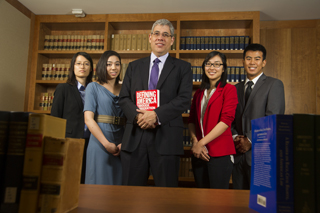
More than a century after a New York lawyer was denied the opportunity to practice law in California because of state laws that barred Chinese immigrants from most careers and opportunities, UC Davis law students are seeking his posthumous admission to the California State Bar.
The students in the UC Davis School of Law Asian Pacific American Law Students Association (APALSA) are asking the State Bar of California, and eventually the California Supreme Court, to admit Hong Yen Chang, who was denied a license to practice law in California in 1890.
Chang attended Yale as part of the Chinese Educational Mission, a pioneering program initiated by the Chinese government. He then left the United States and later returned on his own to study law. He earned a degree from Columbia Law School in 1886 and sat for the New York bar exam by special act of the legislature. When he was admitted to the New York state bar, The New York Times reported that Chang was the first Chinese immigrant admitted to any bar in the United States. In 1890, he came to California with the intention of serving San Francisco's Chinese community as an attorney.
At that time, the federal Chinese Exclusion Act banned Chinese immigrants from naturalizing as citizens, and a California law prohibited noncitizens from practicing law in the state. Taken together, these laws made it impossible for people of Chinese descent to earn law licenses in the state. Chang petitioned the California Supreme Court, but was denied admission.
He went on to a distinguished career in banking and diplomacy, but his story was not forgotten. Now, the students are seeking a symbolic victory on behalf of Chang and others who suffered as a result of laws that discriminated against the Chinese.
"Admitting Mr. Chang would be a powerful symbol of our state's repudiation of laws that singled out Chinese immigrants for discrimination," said Gabriel "Jack" Chin, a professor at UC Davis School of Law and APALSA's faculty adviser on the project. "At the time Chang was excluded from the practice of law in California, discrimination against Chinese persons was widespread. Congress prohibited all Chinese immigration. Even the California Constitution dedicated an entire article to restricting the rights of Chinese residents."
The UC Davis School of Law California Supreme Court Clinic is representing APALSA in the case. It has formally requested the State Bar to support the project and will file a petition with the California Supreme Court seeking Chang's admission. The clinic, the first and only law school clinic of its kind, represents parties and amici in a wide range of both civil and criminal matters pending before the California Supreme Court.
Other states have posthumously admitted applicants who were excluded from their respective bars based on similar discriminatory laws. In 2001, the Washington Supreme Court admitted Takuji Yamashita, a Japanese immigrant who had been refused admission to the profession in 1902. And in 2010, the Pennsylvania Supreme Court posthumously admitted George B. Vashon, an African American who had been denied admission in 1847 because of race.
Chang's descendants remain in the San Francisco Bay Area, including grandniece Rachelle Chong, the first Asian American to serve as a commissioner of the Federal Communications Commission and of the California Public Utilities Commission. "In my generation, our family is extremely fortunate to have three lawyers admitted to the California State Bar: my cousins Suzanne Ah Tye, Kirk Ah Tye, and myself," said Chong. "It would be fitting and right to have my granduncle's exclusion reversed by the California Supreme Court to ensure that justice, albeit late, is done. Our family is honored that the UC Davis APALSA students have taken up the issue of righting a terrible wrong."
"From its inception more than 40 years ago, UC Davis School of Law has been dedicated to the ideals of social justice and equality espoused by Dr. Martin Luther King Jr., for whom our law school building is named," said Dean Kevin R. Johnson. "This effort by our students and faculty to admit Hong Yen Chang to the California State Bar stands strongly within that tradition and is deserving of support."
For more information on the effort to gain bar admission for Hong Yen Chang, contact Professor Gabriel "Jack" Chin.